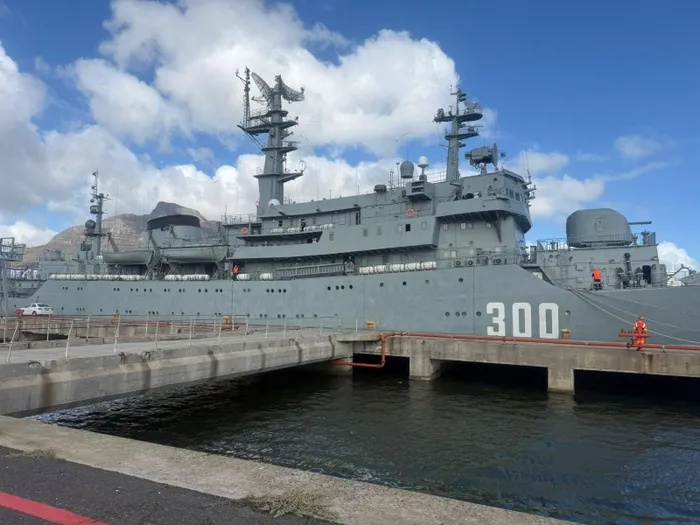Why SA barred Russian vessel

The Smolny is docked at the Cape Town harbour.
Image: Facebook
THE South African government’s last-minute scramble to secure a deal to avoid Donald Trump’s 30% unilateral tariffs is believed to be among the reasons it refused a Russian Navy Baltic Fleet training vessel entry in Cape Town.
The Smolny, reportedly carrying cadets on a training mission to hone their maritime, communication, and navigation skills, had intended to make a brief stopover in Cape Town for restocking, replenishment, and resupply earlier this week.
About 400 personnel are on board the vessel, comprising 200 naval cadets and foreign military personnel from allied nations. The Russian Ministry of Defence stated that future naval officers will receive practical training during the voyage.
The Smolny, on its first African tour, visited Equatorial Guinea (July 20) and Sao Tome and Principe (July 23), offering guided tours to military, police, students, and local Russians. On July 27, it docked in Pointe-Noire, Republic of Congo, where naval cooperation talks were held.
After departing on July 30, The Smolny arrived in Cape Town on August 5. Following South Africa, it travelled to Tanzania and Vietnam before returning to Vladivostok in late September.
While the Department of International Relations and Cooperation (DIRCO) has remained tight-lipped regarding the specific allegations, a senior government source, speaking on condition of anonymity, attributed the denial to "late negotiations with Donald Trump over the tariffs saga".
“These visits typically signify friendly relations and mutual recognition between nations. However, this 'tariffs saga' with US President Donald Trump introduces a new dynamic. While the details of these late negotiations remain undisclosed, it is plausible that South Africa faced pressure or made a strategic concession to avoid punitive tariffs or to secure favourable trade terms with the United States,” the source said.
DIRCO spokesperson Chrispin Phiri did not respond to text messages containing questions regarding why the vessel was denied entry.
The uMkhonto weSizwe Party (MKP) said the decision to deny the ship entry was as a direct affront to long-standing bilateral ties with Russia.
"Denying access to the port of entry in Cape Town can only strain diplomatic relations between South Africa and Russia," the MK Party’s statement read.
The party said Russia was a "key strategic partner to South Africa and a fellow member of BRICS".
Beyond the immediate diplomatic implications, the MK Party also slammed President Cyril Ramaphosa, demanding his "urgent intervention" in the matter.
They accused his "continuous absence from leadership at critical moments" of undermining the South African government, weakening the economy, and now, with the Russian ship incident, threatening to strain South Africa’s relations with Russia.
Political analyst Dr John Molepo said the timing of The Smolny's arrival, coinciding with the critical tariff negotiations, may have placed the South African government in a precarious position, forcing a decision that, while perhaps uninviting, was deemed necessary for broader economic or strategic considerations.
“The government's apparent silence on the matter, with DIRCO only acknowledging 'allegations', further suggests the sensitivity surrounding the decision. Publicly acknowledging a direct link to US tariff negotiations could be perceived as a submission or a lack of sovereign decision-making, potentially straining relations with other allies.”
Molepo said maintaining a degree of uncertainty allows the government to manage the diplomatic fallout and avoid explicitly siding with one global power over another, despite its stated neutral stance on international affairs.
Cape Times
Related Topics: